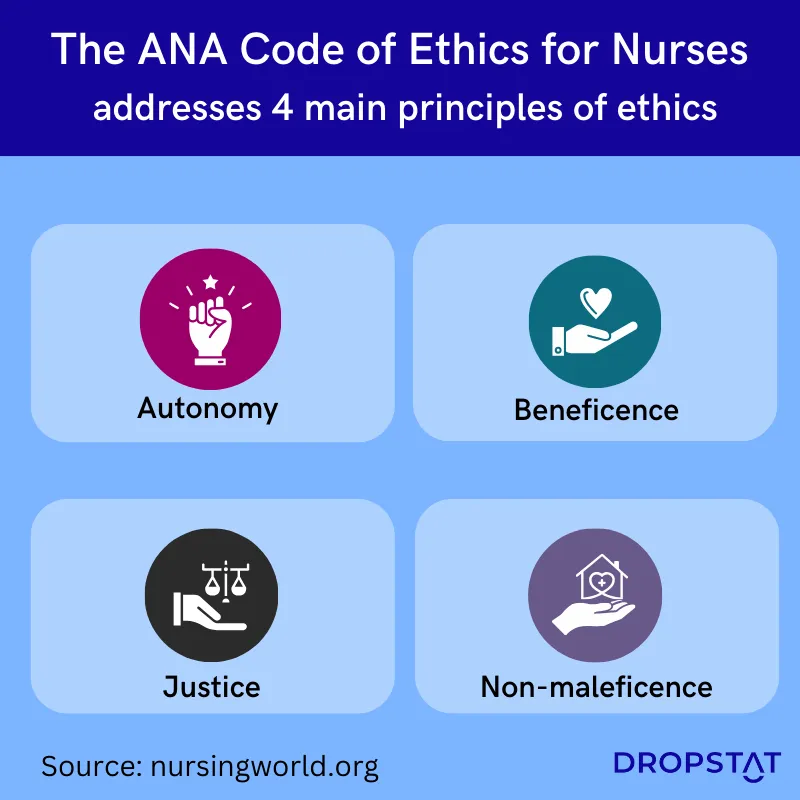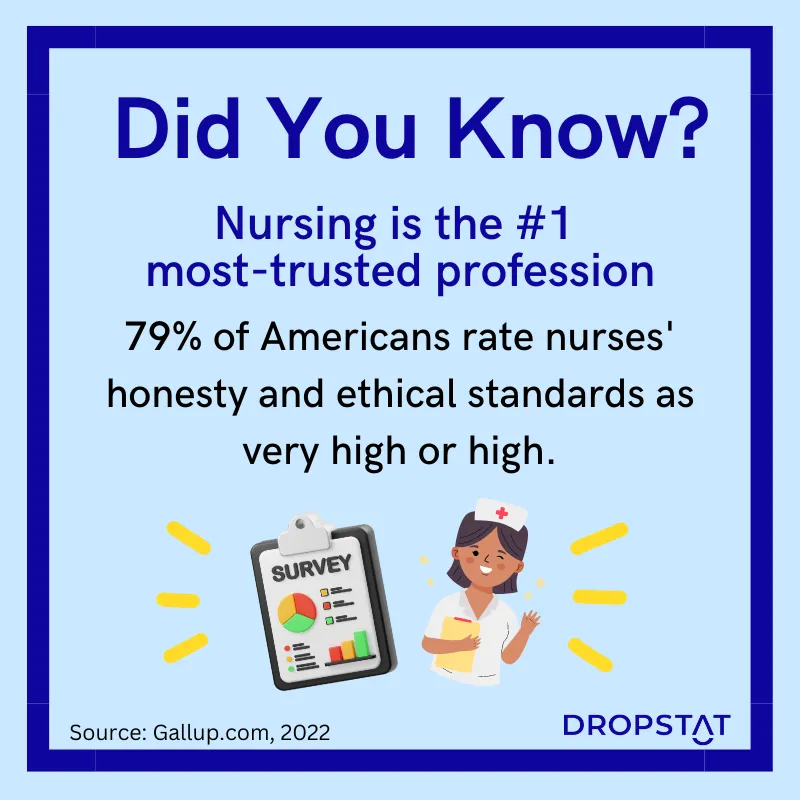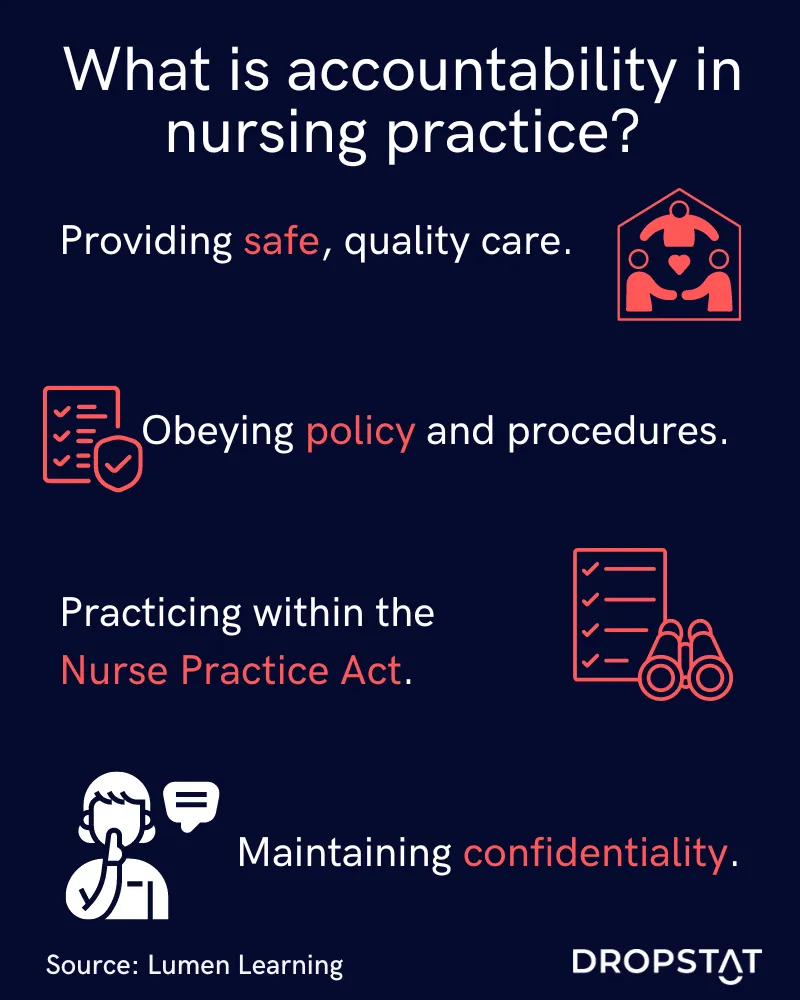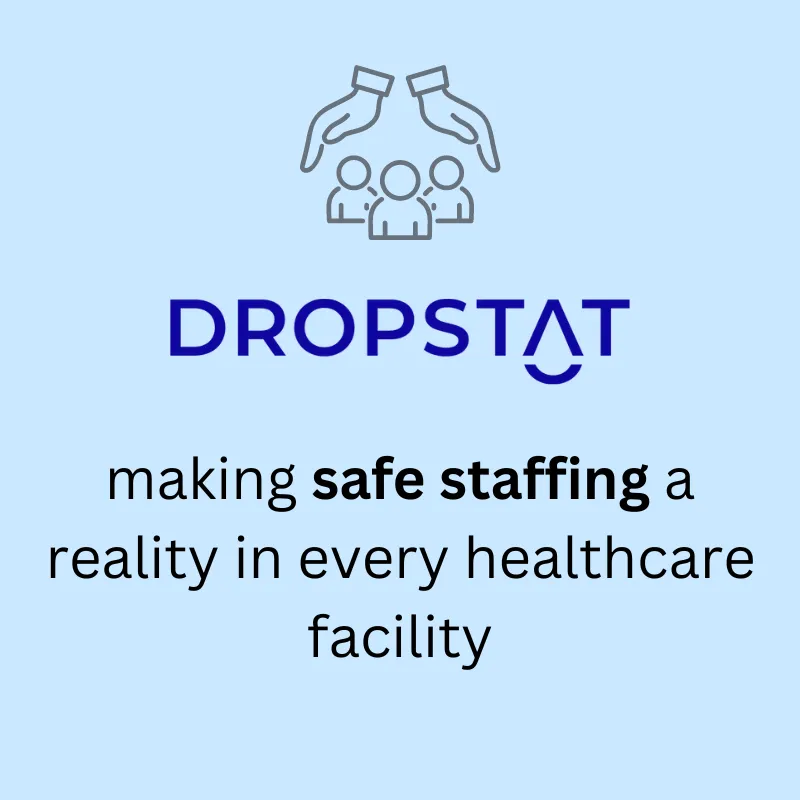Workforce challenges are the number one challenge for hospitals, according to the most recent ACHE report on the survey of Top Issues Confronting Hospitals. Deborah J. Bowen, CEO of ACHE, says hospitals must respond by investing in long- and short-term solutions such as developing all staff. Dropstat discusses how hiring nurses and technicians with nursing values can help with workforce challenges.
What are nursing values? How do they influence nursing care?
Nursing values are the ideals and beliefs that guide nurses when they care for patients and when they make important decisions. Nurse education must include teaching core nursing values. The nursing community highly values nursing students who take part in nursing programs that promote ethical knowledge.

Some core values of nursing are:
Integrity in nursing
Having integrity means offering patient care of the high quality expected in the healthcare facility, combined with honesty and moral and ethical standards. Patients are more open to health care offered by nurses who act with integrity and who share information with forthrightness twinned with sensitivity.
Human dignity in nursing
Valuing human dignity means respecting the value of each person. This means speaking to a patient with respect, maintaining their privacy, and being person-centered. Nurses who treat patients with human dignity, communicate thoughtfully and kindly and try to see the situation from the patient’s point of view. Perspective-taking often helps nurses to respect the patient’s healthcare choices and improves communication in nursing.
Empathy in nursing
Nurses can give patients better care if they express empathy to a patient by putting themselves conceptually in the patient’s place. In addition to physical care, nurses must be trained to assess social cues. Nurses identify which feeling a patient is feeling, understand the patient’s emotions, support the patient verbally, and give physical help. Discussing an emotion often reveals further health needs and contributes to creating nursing care plans that are better for patient care.
Employee loyalty
Nurses who show employee loyalty will likely carry that through to high-quality patient care and maintain core nursing values for patients. Employee loyalty is a nursing value that ensures all aspects of a specific patient’s treatment plan are carried out. Nurses with employee loyalty often learn about relevant medical advancements. This is an advantage for patient care and also provides for your facility’s talent pipeline.
Compassion in nursing
Compassion in nursing begins when nurses interact with patients and patients’ families and use personal and professional curiosity in a helpful way to eliminate patients’ concerns. Compassion can drive nurses to continually study medical advancements and learn about new medical procedures. This ensures they will be qualified to offer the most advanced medical procedures using new technologies for patients.
Diversity in nursing
Diversity in nursing is an important value system in patient care. Diversity and inclusiveness can strengthen patient-provider relationships and address healthcare inequities, improving patient care. Examples of diversity in nursing are:
- looking at patients as people, not stereotypes
- not applying general assumptions to individuals
- respecting and taking a patient’s background into account
- asking for patient feedback to create a more inclusive environment
- incorporating culturally competent behaviors in educating patients
Social justice in nursing
Whenever care providers meet with patients, it is an opportunity to practice social justice in nursing by screening for unmet social needs and providing care and advocacy. If social issues affect a patient’s health, nurses can advocate for fair treatment. Nurses must follow the Nursing Code of Ethics which is ethics related, yet, has legal implications.
Accountability in nursing
Accountability in nursing means treating patients while remaining aware of the ripples that follow every action and provision of care. Nurses are accountable to themselves, to the healthcare team, to consumers of healthcare services, to their employers, and to society. Providing quality care with accountability means using resources for their intended purposes, using equipment carefully, and administering medication conscientiously as prescribed.

Core values of nursing – summary
- A nurse’s professional values accompany them through their workday and ensure they give fair treatment to all patients.
- Having a set of values enables nurses to use critical thinking continuously under day-to-day conditions and even emergency scenarios. Quality care is synonymous with having professional nursing values.
Why are nursing core values important for the healthcare team?
This article discusses earlier, how important nursing values improve nursing practice for patient care. Nursing core values are essential in high quality patient care – for nurses and patients.
Some ways that core values affect the nursing team are they:
- guide action, behavior, and ethical decision-making
- help nurses respect every member of the nursing team
- the overall atmosphere in the work environment is positive
Why is professionalism in nursing significant to a healthcare CEO?
Professionalism in nursing is significant to a healthcare CEO for the well-being of the staff of their healthcare facility and the reputation of the facility in the public eye. Professionalism in nursing can help improve revenue cycle management and profitability, too.
Healthcare leaders can measure professional nursing values in their staff through questionnaires or in-person interviews to ensure that every nurse and technician has a professional manner.
Noticing the professional values of nurses should be part of the recruiting process.

5 tips to recruit healthcare workers who uphold the core values of nursing
Ethical nursing is a major part of nursing education. Healthcare facilities need to make sure that their staff members have the correct ethical values. Here are some tips to help you recruit nurses with values:
1. Check for membership in nursing organizations
Confirm that potential nurses belong to nursing organizations that share the same values as your healthcare facility.
2. Seek soft skills that reflect values
Ask questions with open-ended answers about soft skills such as showing compassion, the ability to collaborate, and how they think they would respond under stress.
3. Ask how nurses deal with conflicts
Ask nurses what they would do if their job conflicted with their beliefs and value system. Search online for “values-based interview questions,” or have your healthcare facility’s HR team write their own questions.
4. Assess values through asking questions
In interviews, make sure to leave time for nursing candidates to ask questions. Notice if their questions relate to how they can understand given tasks better or only about receiving financial compensation and vacations. Do they ask about fulfilling their obligations or offering more time, or do they only appear to be concerned about their rights? Questions can reveal a lot about the values of nurse candidates.
5. Investigate their experiences with diversity
Discuss situations where nurses might deal with patients of different ages, cultures, or nationalities. Ask candidates if they came upon values-related issues in their previous place of work and how they dealt with them.

How Dropstat helps healthcare facilities oversee nursing values via tracking attendance
Dropstat is a powerful tool for managing nursing schedules and staff attendance. Dropstat’s AI-powered staff scheduling app enables nurse schedulers to schedule nurses for every shift in every department of your healthcare facility. This ensures that nurses of all necessary disciplines are scheduled up to 2 months in advance. Adjustments can be made by nurse schedulers subject to discussion between individual nurses and nurse managers via Dropstat’s secure, internal system of communication.
Via attendance tracking, nurse managers can easily see the following:
- Which nurses have excellent attendance records
- Nurses that start on time and stay for their whole shift, every shift
- Efficient nurses who do their hours and can take on open shifts
Nurses with values and ethics take care to be punctual and present for their shifts. Attendance can indicate and measure nurse’s values towards their jobs and their patients. Values and nursing go hand in hand. Nurses who do all their shift hours show that they have loyalty, accountability, and other important nursing ethics.
Schedule a demo today with Dropstat to learn how to empower your healthcare facility’s commitment to nursing values via nurses’ attendance.
Nursing values FAQ
Why should your facility have nurses with core values of nursing?
– Nurses who uphold core values have organizational commitment, which reduces nurse turnover intention.
– Nurses with organizational and personal values participate and “work more actively” (Wei et al., 2021).
– Accountability in nursing means expensive resources are not wasted, stolen, or used improperly.
– Nurses who practice values are likely to embrace leadership and visionary thinking in their career development, including taking on administrative and financial-related roles in the nursing profession.
– Nurses who have values will commit to doing their hours and all shifts and avoid nurse absenteeism, which is damaging to employee morale and patient care.







